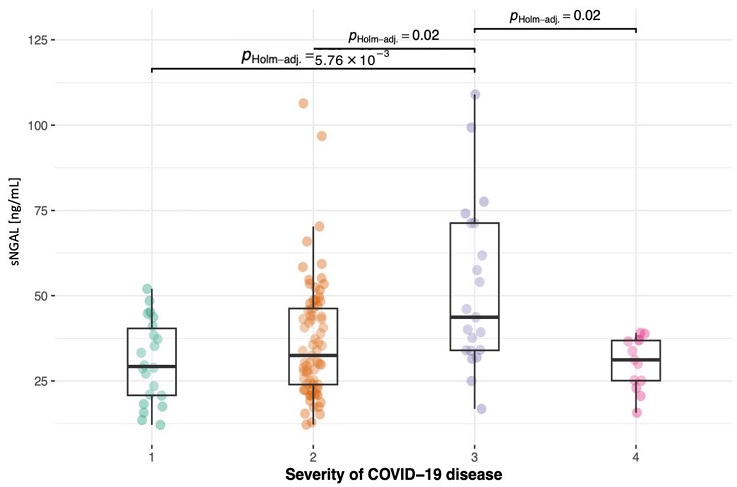Post COVID-19 Individuals Tend To Display Elevated Levels Of Neutrophil Gelatinase-Associated Lipocalin Even At Three Months Follow Up
Nikhil Prasad Fact checked by:Thailand Medical News Team Mar 24, 2024 1 year, 10 months, 4 weeks, 2 days, 6 hours, 23 minutes ago
COVID-19 News: The aftermath of the COVID-19 pandemic has brought to light a range of health concerns that extend beyond the acute phase of the disease. Among these concerns, the persistence of symptoms and complications in individuals who have recovered from COVID-19, often referred to as Post-Acute COVID-19 Syndrome (PACS), has garnered significant attention. One aspect that has emerged from recent research is the potential role of Neutrophil Gelatinase-Associated Lipocalin (NGAL) as a biomarker in assessing the inflammatory and immune responses post-COVID-19 infection.
 Post COVID-19 Individuals Tend To Display Elevated Levels Of Neutrophil Gelatinase-Associated Lipocalin Even At Three Months Follow Up Boxplot depicts sNGAL levels in the groups according to the modified WHO COVID-19 severity scale presented above. Serum NGAL levels were significantly higher in the group of nonhospitalized patients at the 3rd stage, whereas 4th-stage patients who were hospitalized and received treatment presented lower sNGAL levels; p values for each pair are presented.
Introduction to NGAL and Its Significance
Post COVID-19 Individuals Tend To Display Elevated Levels Of Neutrophil Gelatinase-Associated Lipocalin Even At Three Months Follow Up Boxplot depicts sNGAL levels in the groups according to the modified WHO COVID-19 severity scale presented above. Serum NGAL levels were significantly higher in the group of nonhospitalized patients at the 3rd stage, whereas 4th-stage patients who were hospitalized and received treatment presented lower sNGAL levels; p values for each pair are presented.
Introduction to NGAL and Its Significance
Neutrophil Gelatinase-Associated Lipocalin, also known as lipocalin-2, is a protein that plays a crucial role in the innate immune system. It is an acute-phase protein, meaning its levels increase rapidly in response to inflammation or injury. NGAL is primarily produced in neutrophils and is expressed in various tissues throughout the body, including the lungs, kidneys, heart, intestines, and adipose tissue.
The significance of NGAL lies in its diagnostic potential, particularly in identifying acute kidney injury (AKI) early. During the COVID-19 pandemic, AKI emerged as a complication in a significant proportion of patients, especially those with pre-existing conditions such as diabetes, hypertension, or chronic kidney disease. NGAL's role expanded beyond kidney injury, as it was found to be elevated in patients with lung epithelial damage, such as that seen in COVID-19-related respiratory complications.
Research Aim and Methodology
A collaborative study that is covered in this
COVID-19 News report conducted by researchers from the Medical University of Silesia in Katowice, Poland, and the Maria Sklodowska-Curie National Research Institute of Oncology, Poland, aimed to investigate the levels of serum NGAL (sNGAL) in individuals three months after recovering from the acute phase of COVID-19. The study included 146 patients diagnosed with COVID-19 at various stages of the disease. Blood samples were collected three months post-diagnosis to analyze sNGAL levels and assess potential correlations with disease severity, symptoms, comorbidities, and inflammatory markers.
Key Findings and Observations
The study's findings revealed several noteworthy observations:
-Association with Disease Sever
ity: Elevated sNGAL levels were associated with the severity of COVID-19 during the acute phase, except in cases where early treatment was administered to severely affected hospitalized patients. This suggests a potential link between disease severity and sustained inflammatory responses post-recovery.
-Impact on Respiratory Symptoms: Participants experiencing prolonged dyspnea (difficulty breathing) post-COVID-19 showed higher sNGAL levels compared to those whose dyspnea resolved earlier. This association highlights the role of NGAL in assessing respiratory complications and epithelial damage following COVID-19 infection.
-Comorbidities and Inflammatory Markers: Patients with pre-existing conditions such as asthma and chronic obstructive pulmonary disease (COPD) exhibited significantly higher sNGAL levels. Additionally, correlations were observed between sNGAL and proinflammatory cytokines, indicating its involvement in immune response regulation.
-Treatment Influence: Hospitalized patients who received early treatment with antiviral drugs, steroids, and oxygen therapy showed lower sNGAL levels post-recovery. This suggests a potential mitigating effect of these treatments on sustained inflammation.
Implications and Future Directions
The study's findings hold significant implications for understanding the long-term consequences of COVID-19 and identifying potential biomarkers for monitoring post-recovery health. NGAL emerges as a promising biomarker, particularly in assessing respiratory complications and inflammatory responses in convalescent individuals.
Future research directions could delve deeper into the mechanistic pathways linking NGAL to post-COVID-19 complications, explore its utility in predicting long-term outcomes, and investigate interventions that could modulate NGAL levels to improve patient outcomes.
Conclusion
In conclusion, Neutrophil Gelatinase-Associated Lipocalin (NGAL) shows promise as a biomarker in assessing inflammatory responses and respiratory complications in individuals recovering from COVID-19. Understanding the role of NGAL in post-acute COVID-19 syndrome (PACS) could aid in developing targeted interventions and monitoring strategies to improve patient management and long-term outcomes. Further research is warranted to validate these findings and unlock the full potential of NGAL as a diagnostic and prognostic tool in post-COVID-19 care.
The study findings were published in the peer reviewed Journal of Clinical Medicine.
https://www.mdpi.com/2077-0383/13/7/1851
For the latest
COVID-19 News, keep on logging to Thailand Medical News.
